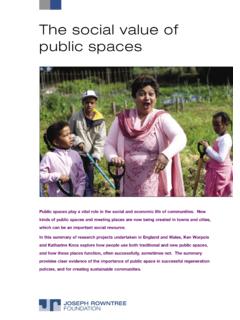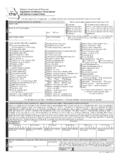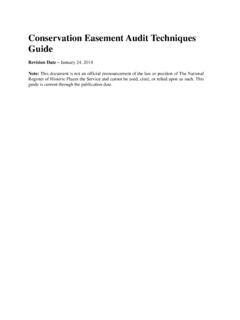Transcription of The mission and purposes of the public library - degruyter.com
1 1. The mission and purposes of the public library The public library , the local gateway to knowledge, provides a basic condition for lifelong learning, independent decision-making and cul- tural development of the individual and social groups.'. (IFLA/UNESCO public library Manifesto, 1994). Introduction This chapter is a general statement on the mission (as defined and mandated by IFLA/UNESCO 1994, Appendix 1) and purpose of the public library . The key issues reviewed are developed in greater detail in later chapters. Defining the public library public libraries are a world-wide phenomenon. Libraries occur in a va- riety of societies, in differing cultures and at different stages of de- velopment. Although the varied contexts in which libraries operate in- evitably result in differences in the services provided, and the way those services are delivered, libraries normally have characteristics in common, which can be defined as follows. A public library is an organisation established, supported and funded by the community, either through local, regional or national government or through some other form of community organisation.
2 It provides access to knowledge, information, lifelong learning, and works of the imagination through a range of resources and services and is equally available to all members of the community regardless of race, nationality, age, gender, religion, language, disability, economic and employment status and educational attainment. 2 THE IFLA public library SERVICE/GUIDELINES. The purposes of the public library The primary purpose of the public library is to provide resources and services in a variety of media to meet the needs of individuals and groups for education, information and personal development including recreation and leisure. They have an important role in the development and maintenance of a democratic society by giving the individual access to a wide and varied range of knowledge, ideas and opinions. The Council for public Libraries initiated a new vision state- ment for Finnish public libraries, The library is a meeting place of people and ideas.
3 library : Inspiring, Surprising, Em- powering.. The Guidelines and Standards for Queensland public Librar- ies were designed to improve current procedures and provide achievable goals for the public libraries in Queensland, Aus- tralia. The standards are seen as a guide towards achieving best practice' for those responsible for the management of public library services (see Appendix 6). < >. Education Supporting both individual and self conducted education as well as formal education at all levels.'. (Manifesto). The need for an agency available to all, which provides access to knowl- edge in printed and other formats such as multimedia and Internet sources, to support formal and informal education, has been the reason for the foundation and maintenance of most public libraries and re- mains a core purpose for the public library . Throughout their lives people require education either at formal institutions, for example, schools, colleges and universities, or in a less formal context related to their employment and daily life.
4 Learning does not end with the com- pletion of formal education but is, for most people, a lifelong activity. In an increasingly complex society people will need to acquire new skills at various stages of their life. The public library has an important role in assisting this process. THE mission AND purposes OF THE public library 3. The public library should provide material in the appropriate media to support formal and informal learning processes. It should also help the customer to make use of these learning resources effectively as well as providing facilities that enable people to study. The ability to access information and make effective use of it is vital to successful education and, where possible, public libraries should co-operate with other edu- cational organisations in teaching the use of information resources. Where adequate library facilities exist to support formal education the public library should complement these. The public library should also actively support literacy and informa- tion literacy campaigns and training, as literacy is the key to education and knowledge and to the use of libraries and information services.
5 Newly literate people need easy access to appropriate information ma- terials and services to maintain and develop their skills. In some countries the need for educational development is seen to be paramount and the focus of public libraries is to support formal education. There are, however, a variety of ways in which public li- braries can support both formal and informal education. How this is achieved will depend on the local context and the level of available re- sources. In Singapore the stated mission for public library service is to provide trusted, accessible, globally-connected, library and in- formation service so as to promote a knowlegeable and en- gaged society.. In South Africa, where many people have inadequate living space and no electricity to enable them to study, public librar- ies have prioritised provision of the basic facilities, artificial light, and tables and chairs. In some countries, libraries are required to fulfil multi-functions , of both public and school libraries.
6 In England, a smaller branch library is combined with a larger school library and located within a leisure facility. In the USA, college and public libraries are sometimes combined, such as the Central library in San Jose, CA and Harris County library in Tomball, TX. < library >. In Amazonas State, Venezuela, where there are few school li- braries, rural libraries concentrate on providing support for students and teachers. 4 THE IFLA public library SERVICE/GUIDELINES. In Barcelona province, Spain, some library services offer sup- port to distance learning students from the Open University in Catalonia. In the State of Queensland, Australia, the Gold Coast City Council Mobile library visits geographically isolated primary schools. Norwegian libraries established quality-controlled internet sites with indexed links to resources suitable for education on different age levels. < >. Large urban libraries like the Queens Borough public library in New York, USA and the Copenhagen public library in Denmark offer customers specially designed learning centres in their buildings.
7 These centres include staff that provides instruc- tional assistance with educational materials and computers. Russian Astrakhan Regional Children's library communicates with young readers online. Incoming questions are referred to appropriate departments with the goal of processing requests within 24 hours. Those residing far from the library can now receive necessary books or magazines. < >. Entrelibros (Between books) is a net of customers and books promoted by the Autonomous Government of Extremadura, Spain. < >. In the State of Queensland, Australia, public libraries provide homework resources and support to upper primary and sec- ondary school children through organised homework clubs in libraries. Electronic homework support is also available. < >. Information The public library is the local centre of information making all kinds of knowledge and information readily available to its users.'. (Manifesto). It is a basic human right to be able to have access to and an under- standing of information, and there is now more information available than ever before in the world's history.
8 As a public service open to all, the public library has a key role in collecting, organizing and exploiting information, as well as providing access to a wide range of information sources. The public library has a particular responsibility to collect local THE mission AND purposes OF THE public library 5. information and make it readily available. It also acts as a memory of the past by collecting, conserving and providing access to material re- lating to the history of the community and of individuals. In providing a wide range of information the public library assists the community in informed debate and decision-making on key issues. In collecting and providing information the public library should, wherever possible, co- operate with other agencies to make the best use of available resources. The rapid growth in the volume of available information and the continuing technological changes, which have radically affected the way information is accessed, have already had significant effect on public libraries and their services.
9 Information is very important to the development of the individual and of society, and information tech- nology gives considerable power to those able to access and use it. De- spite its rapid growth it is not available to many of the world's popula- tions, and the gap between the information rich and the information poor continues to widen in some areas. Sources of widespread public information such as television broadcasting, telephone, and other mo- bile web based services, educational institutions and public libraries are taken for granted in developed countries. In developing countries, however, such infrastructure is seriously deficient, and this hinders in- dividual ability to gather information and solve problems. The Internet promises improvements to internal communications in and among de- veloping countries. public libraries play a role in this and must bridge that gap by providing widespread public access to the Internet (when technologically possible) as well as continuing to provide information in traditional formats.
10 public libraries should recognise and exploit the opportunities provided by the continued and increasing developments in information and communications technology. public libraries continue to provide an important access point to online information services. Some public libraries in South Africa provide space for infor- mation kiosks and telecentres. Rural multi-purpose community telecentres established in 5 Afri- can countries (Benin, Mali, Mozambique, Tanzania and Uganda). provide access to modern information and communication tools. The public library in Memphis, TN, USA, includes non-traditional information such as genealogy records, a small business cen- tre, and job opportunities listings. Other city libraries in the USA, in Dallas, TX and San Francisco, CA, offer local, state and national government information. 6 THE IFLA public library SERVICE/GUIDELINES. Open access Internet points are available in public libraries in Estonia. Australia's Gold Coast City Council regularly hosts a two day Techno Expo providing customers opportunities to explore and learn all about gadgets, tools and concepts which incor- porate the latest technologies.




